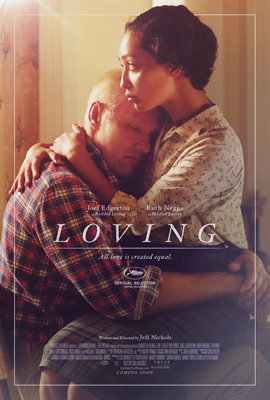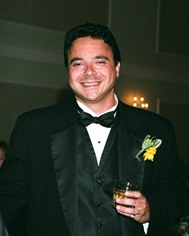 If there were ever a movie to assuage the division in America after a turbulent presidential election and restore any faith lost in our country or ourselves, it’s “Loving,” Jeff Nichols’ film depicting the true story of Richard and Mildred Loving’s decade-long fight to make their interracial marriage a constitutional right. Easily one of the year’s best films, “Loving” is a movie of hope and serves as a reminder to all Americans that right is actually what makes might.
If there were ever a movie to assuage the division in America after a turbulent presidential election and restore any faith lost in our country or ourselves, it’s “Loving,” Jeff Nichols’ film depicting the true story of Richard and Mildred Loving’s decade-long fight to make their interracial marriage a constitutional right. Easily one of the year’s best films, “Loving” is a movie of hope and serves as a reminder to all Americans that right is actually what makes might.
“Loving” is a movie well-told because it’s simply told: its story and characters are simply drawn, making the film all the more effective because we instantly relate to the people and their situations. We’re introduced to the Lovings, Richard (Joel Edgerton) and Mildred (Ruth Negga), as they sit on the front porch of a house in rural Virginia. Mildred tells Richard she’s pregnant; Richard smiles with pride and tells her that’s good. Richard works construction and immediately buys property to build a house for his impending family. He shows Mildred the property, making sure she approves of where he’s planning to place the rooms, and asks her to marry him. She accepts and we relate to the Lovings’ situation- they’re decent, hard-working people preparing for a future together. There’s just one problem: Richard’s white, Mildred’s black, and it’s 1958.
Richard, undaunted by Virginia’s prohibition of interracial marriage, drives Mildred to Washington D.C. to be married. Mildred’s father (Christopher Mann) rides with them to witness their union, his stoic support belies the trouble he knows the two are up against. Proudly framing their marriage license and hanging it by the bed they share, the Lovings are awakened in a pre-dawn police raid by Sheriff Brooks (Marton Csokas) and taken to jail. Richard makes bail; Mildred does not- because Richard is white, he can’t bail out Mildred and is told he must wait to meet with the judge. Brooks intercepts Richard leaving the jail to explain the way things work between the races in Virginia and makes for a great scene between Edgerton and Csokas: Csokas, an actor best known for playing the baddie in films like “The Bourne Supremacy” and “The Equalizer,” oozes controlled menace explaining God’s law and why His will made species different for a reason. When Richard humanly pleads for Mildred’s release because she’s pregnant, Brooks coldly states he could incarcerate Richard again just for saying that.
Loving’s lawyer (Bill Camp) has the Lovings agree to a plea deal to avoid prison- in pleading guilty, their one-year sentence will be suspended. Upon meeting with the judge and pleading guilty, their sentence is suspended but they must leave Virginia for 25 years. The film documents the Lovings’ 10-year journey to be able to return to their home in Virginia as a couple and remain with their family in the only place they’ve ever known; it’s a journey that will lead them to the United States Supreme Court and change the American Constitution.
“Loving” is not a violent film in the face of racism, it is a film of ostracism. Nothing conveys the horror of that forced isolation better than Joel Edgerton’s performance as Richard who, donning a ‘50s crew cut and blue collar clothes, displays all of the confusion of a man not understanding why he can’t marry and raise a family with the woman he loves. Though he knows their union is taboo to the powers that be, he’s grown up with blacks and just wants to live peacefully with Mildred in the small Virginia town they’ve always shared. The pain etched on Edgerton’s face when Richard’s reprimanded by family and friends for “knowing better” is palpable- even when a friend tells Richard just to divorce Mildred to return home, we know Richard’s desire for a family doesn’t make that an option. Edgerton’s understated tone when asked what statement he’d like to tell the Supreme Court and simply saying “Tell them I love my wife” brings all of these internal emotions to bear- it’s a great performance.
In addition to Edgerton, Negga as Mildred gives an equally good understated performance and writer/ director Jeff Nichols (“Take Shelter,” “Mud”) has given “Loving” the gravity of other films depicting past atrocities in our intolerance for human rights, like the Holocaust in “Schindler’s List” or slavery in “12 Years a Slave.” “Loving” joins that pantheon of films by bringing our history of racial intolerance to a time span closer than we’d like to admit.
If we don’t learn from history, we’re doomed to repeat it. As timely now as they’ve ever been, American movies like “Loving” are made to prevent the recurrence of mistakes from our not-so-distant past and reaffirm our belief in ourselves and one another.
